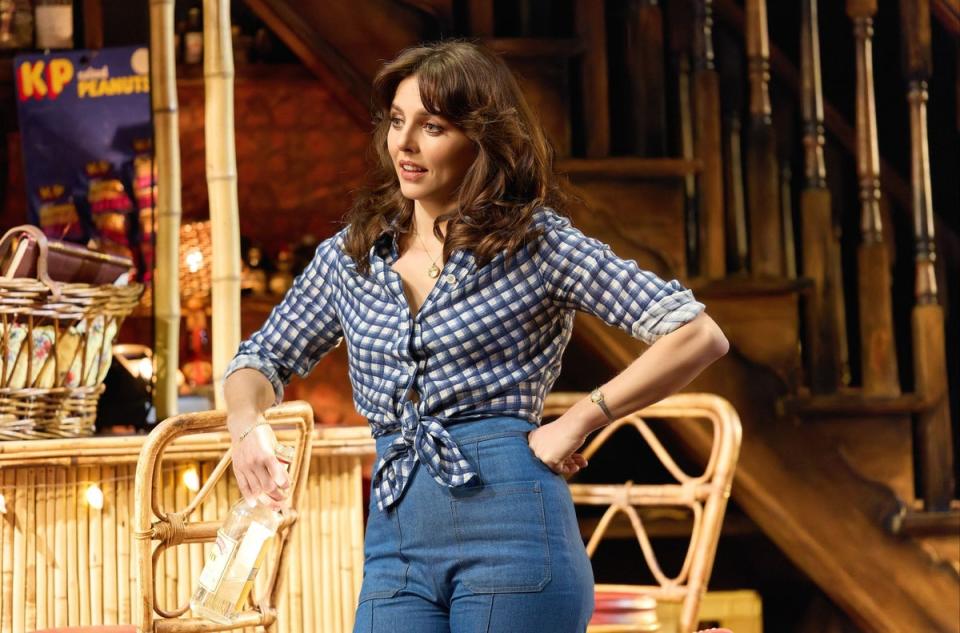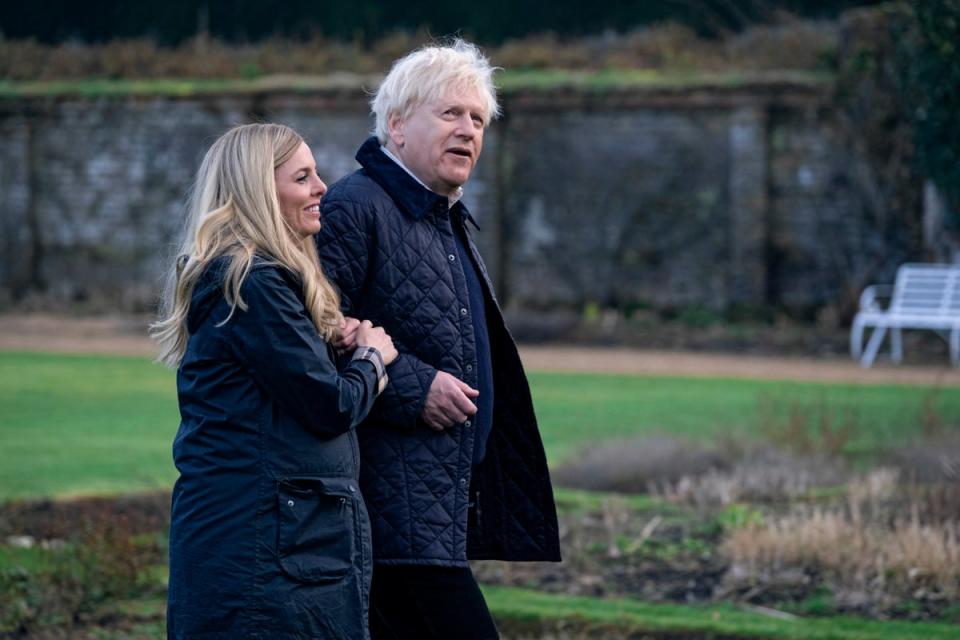When Ophelia Lovibond took the stage last week during the opening night of The Hills of California, she was euphoric. “It was bliss, a wonderful feeling,” she tells me the next day. “My agent said she saw me glowing like the cat that got the cream.”
Returning to the West End for the first time since 2016, the experience reminded her that “being on stage is exciting, there’s nowhere else to be but in the moment. I like cliff jumping. The sensation of jumping into the sea is the only thing that can be compared.”
Lovibond, who has won fans for standout turns in W1A, contemporary Sherlock Holmes show Elementary and recently as Carrie Johnson in This England, says: “I’m a Londoner, there’s something special about performing on the London stage.” It probably helps that the show is one of the most anticipated new works in recent years.
That’s because this story of four sisters who return to their childhood home in Blackpool as their mother lies dying upstairs was written by Jez Butterworth, whose work includes two of the most acclaimed plays of the 21st century: Jerusalem and The Ferryman . Although it appears that 37-year-old Lovibond did not see that either. “I don’t think Jez knows that,” she laughs. “I was filming one movie and the other time I couldn’t get tickets. I remember telling people, ‘I’m going to sell a kidney!’”
As we talk in a noisy restaurant in Fitzrovia, Lovibond, relaxed in jeans and a tan sweater, pays the playwright a pretty strong compliment when he talks about the rehearsal process. “It’s like having Chekhov in the room… he’s extraordinary, it’s extraordinary writing. Not a word is wasted.”
If Butterworth was like having Chekhov in the room, director Sam Mendes brought a different atmosphere, especially in the pep talks he would give the actors before early shows – that of a certain outgoing Liverpool manager. “We called him the Jurgen Klopp of the theater, because those conversations are really good. Well, Leanne [co-star Leanne Best] said…she’s from Liverpool.’


The play begins in the long, hot summer of 1976, when the sisters are reunited and look back on the past, slowly revealing the secrets they hid from each other. It then returns to 1958, with them as young girls; their mother tries to get them into an Andrews Sisters-style group good enough to make it to the London Palladium. “It’s a play,” says Lovibond, “about the burden of hope.”
Lovibond plays the confident Ruby, who struggles to cope when her preconceptions about her family are shattered. She immediately bonded with the actors who played her adult sisters – Best, Laura Donnelly and Helena Wilson – and with the actors who played their young counterparts, and says Butterworth’s portrayal of family feels perfect.
She says, “I don’t see myself getting tired of that feeling. To be on stage with so many women. And they are such richly drawn characters; they are not the wife, the girlfriend. It’s our story. The fact that such a show is remarkable is… annoying.”
There are dark secrets in the family and some reviewers have described it as a post #MeToo game, a theme that is deftly handled. “It shows that something like this is not a one-off event,” says Lovibond. “It may be for the perpetrator, but for the survivor it’s for the rest of their life… it changes your molecular makeup. It is good to investigate that.”
Since the start of #MeToo and the #TimesUp campaigns in 2017, Lovibond has regularly spoken out about improving conditions for women in the entertainment industry and strengthening safeguards. “It hasn’t gone away. There are flare-ups when these big things make the news, but it’s important to get people talking about it and advocating for change.”
She’s going to a #TimesUp meeting the following week, she says. “It’s very much going on. It is about guidelines that are being introduced and practices. It certainly has legs. There would have been a time when I would have been terrified to say something if it had happened to me or if I had seen something. Now I wouldn’t hesitate.”
She got her first role at the age of 12 in Channel 4’s The Wilsons and found ways to protect herself on set. Whether it was also about the way she was addressed – “a director didn’t want to call me by my name; it was ‘honey’ or ‘sweetie’ and only stopped when I started calling him ‘toots’ and ‘sweet cheeks’, which was seen as unacceptable. That wouldn’t happen now” – to a scene in which the actors were told to get on screen, change clothes in front of the camera and run away.
The director promised that they would be filmed only from the shoulders up. So she and the other actors used a charcoal pencil to draw smiley faces and peace signs all over their bodies and legs. The director wasn’t happy: “I said, ‘You’re not going to see it, so why does it matter?’ He had lied, they were going to show everything.


‘I knew he was lying. Being on sets, you trust your instincts. There are a lot of things like that. Now I would trust the process because there’s an intimacy coordinator, all that stuff is pre-agreed and signed so you don’t have people saying, ‘You hold up the set, go ahead, just take your top off, don’t put it on .’ “Don’t you want to be a daring actress?” None of that would exist.” She added: “I’m just glad things are changing.”
Lovibond – who lives in Hornsey with her actor husband Henry Pettigrew – was raised by her mother with her two siblings on a housing estate in west London after her parents split when she was young.
From her name, people often assume she comes from a privileged background. She rolls her eyes. “Well, I damn sure don’t think so.” She continues, “I understand because I’m articulate and have a ridiculous name, but the reason it makes me angry is because I worked really hard for this. I wasn’t born to a famous parent or a producer parent. I grew up in a residential area. I speak this way because I won a drama scholarship to a public school [Latymer Upper School] and this accent emerged when I went to school with people who spoke like this.
“In terms of a quick route through wealth and connections, absolutely not. I worked hard and I think that’s why I don’t have imposter syndrome. I’ve earned my stripes. I don’t want to sound arrogant, but I’m proud that I did it, it wasn’t given to me.”
Her name shows that she never played Ophelia. “She only plays a very small role,” says Lovibond, laughing. “But I would do Hamlet.”
Lovibond found acting in a drama club called YoungBlood on her estate, for which her mother had to pay 50 cents per term. It is no longer there and she points to the closure of many similar clubs. “I wonder if I could do this if I started now.”
The lack of support for the arts from the government was a concern and she was outraged by the advert about a dancer being retrained for a job in the cyber world. “When the government said that I thought: ‘How dare you?’. Britain is known worldwide for its stories and culture. It’s so strange to me.”
Recent roles have placed her right at the heart of Boris Johnson’s government. The first was in This England, which aired on Sky last year, in which she played Carrie Johnson opposite Kenneth Branagh’s Boris in a series chronicling the former Prime Minister’s response to the Covid crisis.
She did not contact the real Carrie to prepare for the role and never heard back from the couple. “I was curious… I bet they looked at it.”
Before taking the role, she says, “I hadn’t really thought much about her. I don’t think it was right for her to get involved in things, she’s not an elected official. But I thought the way she was portrayed in the press was quite sexist, so childish.”
Lovibond is clearly no fan of the government – “Their actions speak louder than any words I can utter” – but has playing Carrie Johnson changed her mind about the couple? “No,” she laughs.


That role was followed by Partygate, Channel 4’s dramatization of the parties that took place in Downing Street during lockdown, in which she played a special adviser, an amalgamation of real people. “It was just indefensible,” says Lovibond. “It wasn’t just a few drinks in the garden, this was people throwing up, red wine on the walls – I attended a socially distanced funeral and there was hardly anyone there. It still makes me so angry.”
Before Lovibond has to rush off to prepare for tonight’s performance at the Harold Pinter Theater, I ask her if a story I read about a run-in with a casting director was true. It was her first time in LA, for pilot season, when she was only 22.
“Yes. She said, ‘You’re too quirky to ever play leading roles. You could play the friend.’ I stood up, shook her hand and said, “I look forward to proving you wrong.” And I left.”
When she was young, a decade in the business had protected her from these kinds of comments. “I thought, ‘It’s good work, I’ve been doing this for a long time.’ It was obviously hurtful, but I thought, ‘Well, that’s just your opinion, I’m not going to let one person’s opinion define me.’ God, that was weird. I never met her again.”
And it’s a testament to Lovibond, her willpower and her talent, that she has proven the casting director wrong time and time again.
The Hills of California runs at the Harold Pinter Theater until June 15; book tickets here